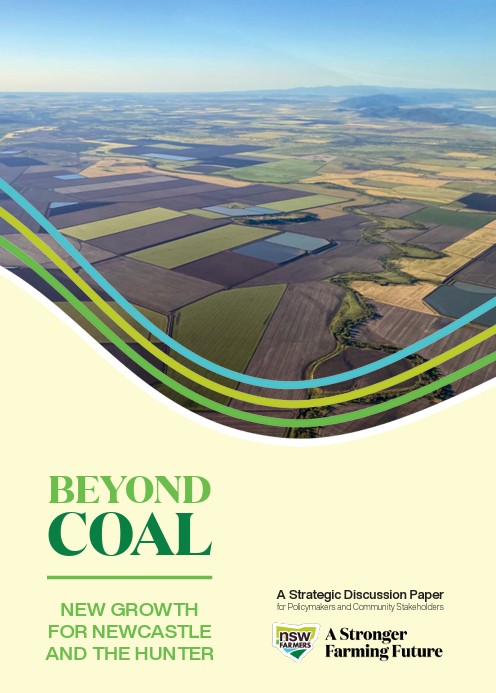NSW Farmers Association, Media Release, 23 October 2025
The state’s peak farm body says Newcastle and the Hunter Valley have a golden opportunity to build a strong future around agriculture as it transitions from coal.
On Thursday NSW Farmers Board Director Bronwyn Petrie launched Beyond Coal: New Growth for Newcastle and the Hunter, a discussion paper which laid out how the region could create 88,000 new jobs and generate an additional $20 billion for the state economy within the near future.
“We’re hearing from all sides of politics that there is a limited future for coal, and even gas is a temporary measure, but there is a huge opportunity for the Hunter to build a permanent future by embracing agriculture,” Mrs Petrie said.
“Now of course we don’t mean planting wheat at Broke or running sheep over Mount Sugarloaf, what we’re talking about is value-adding, which will be an economic gamechanger for Australia.
“Data shows we could create roughly 88,000 new jobs and add $20 billion to the state’s economy if we embrace value-adding, and Newcastle and the Hunter are in a prime position to make this happen.”
The discussion paper focused on how the region was uniquely positioned to take advantage of existing opportunities in food and fibre value-adding, and what future investment in training, processing and logistics would be needed.
“As farmers we see an enormous amount of raw commodity – things like wool and wheat – get shipped off overseas and sold back to us as expensive consumer products,” Mrs Petrie said.
“With targeted investment in skills, roads and rail, and a focus on processing and manufacturing along the route from farm to Port of Newcastle, the Hunter can move from powering the world to feeding and clothing it and prosper in the process.
“Coal seam gas from Narrabri is not a future-proofing plan, it’s just a cheap sugar hit for the economy while it risks contaminating vital groundwater and the environment. We say there’s a better way, and here’s a more sustainable opportunity for the Hunter to seize.”
Practical recommendations
- Invest in agricultural skills and training: Expand education programs in food science, logistics, and advanced manufacturing to prepare the workforce for new roles.
- Improve road and rail infrastructure: Repair roads, upgrade total axle load limits, and support the creation of grain terminals, cool storage, and intermodal hubs to enhance flow of containerised products.
- Repurpose degraded mining land for renewables: Prioritise solar and wind projects on former mine and power station sites to protect prime agricultural land.
- Prioritise food and fibre production: Reject the Narrabri Gas Project and any other risky proposal that threatens vital groundwater or agriculture.
- Encourage investment in niche processing and manufacturing: Offer incentives for food tech, value-adding and specialty production, diversifying the economic base.
Read the full discussion paper here.

